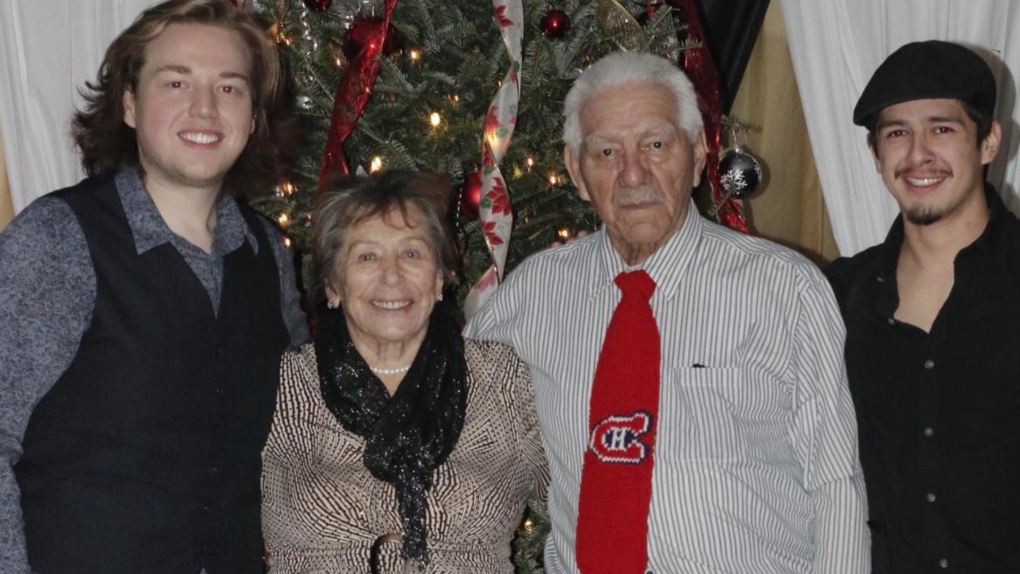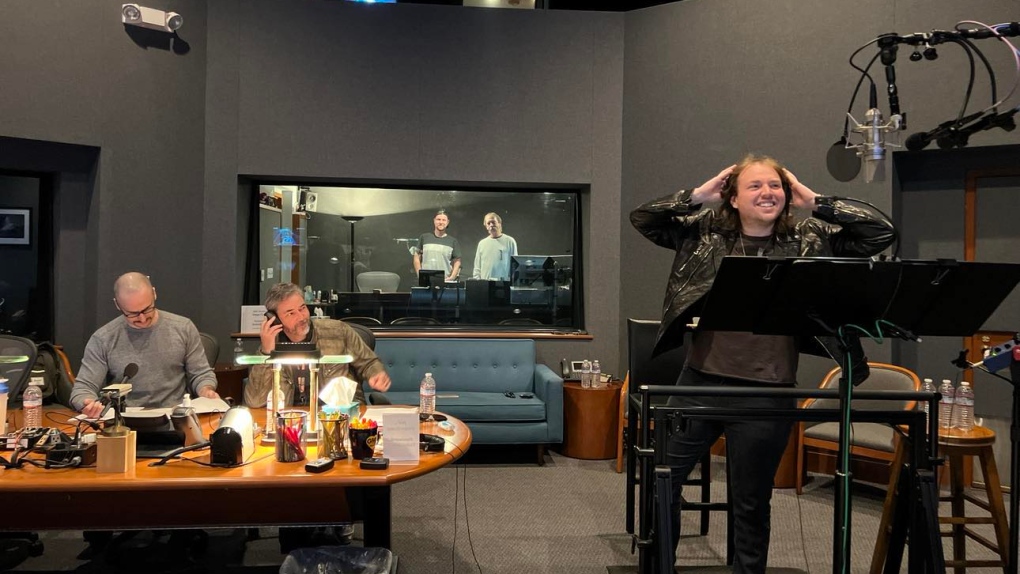Marvel's 'What if...?' episode puts spotlight on Indigenous language and culture
What if a Kanien'kehá:ka (Mohawk) young woman was granted powers from the Tesseract and returned to her village to save it from colonial powers bent on destroying her people?
What if that was on film and spoken in the original Mohawk language - Kanien'kéha and voiced by actors from Kahnawake?
"What if Kahhori Reshaped the World" is the answer to those questions and is an episode in season two of Marvel's "What if...?" series streaming on Disney Plus? It's a series that reimagines the Marvel Cinematic Universe (MCU) and history itself.
Kahnawake actor Kawennáhere Devery Jacobs voices the lead character with all her lines entirely in Kanien'kéha.
"Our language was nearly extinct, and so that was another reason that I thought it was so important to be a part of this project and for me personally to be able to learn Kanien'kéha and be able to portray and act in this language that's so familiar, but also has been so lost in in our communities." she told CTV News.
Jacobs' sister Kwaharani speaks the language fluently and helped Devery become more comfortable with the syntax.
The girls' grandmother Kaiatitahkhe Jacobs helped develop the immersion program in the community and spoke the language growing up. She was at the screening.
"When I heard Kawennahere, I'm getting emotional right now, when I heard her speak, the tears just automatically came," said Kaiatitahkhe . I couldn't stop it. It became such a wonderful feeling. It just fills you with so much pride and love for this girl that's doing this. That she's my granddaughter."
 Kaiatitahkhe Jacobs speaks her Mohawk language Kanien'kéha fluently and became emotional hearing her granddaughter Kawennáhere Devery Jacobs speak it in Marvel's "What if Kahhori Reshaped the World" on Disney Plus. (Daniel J. Rowe/CTV News)
Kaiatitahkhe Jacobs speaks her Mohawk language Kanien'kéha fluently and became emotional hearing her granddaughter Kawennáhere Devery Jacobs speak it in Marvel's "What if Kahhori Reshaped the World" on Disney Plus. (Daniel J. Rowe/CTV News)
"I was so nervous because she is such a beautiful speaker and educator and getting to hear her feedback on on what she thought about it and hearing that in her words," said Devery. "She said I sounded like a first language speaker was a compliment to the highest degree that for me, like as far as I'm concerned, I've done my job."
Jeremy White voices "Atahraks" in the episode. He grew up immersed in the language through his grandparents and schooling.
"I used to be fluent in Kanien'kéha, I went to Mohawk immersion from nursery up to grade six. For the first decade and a half, basically, I spoke the language fluently," said White. "I grew up with my first language-speaking grandparents, my Tota (grandmother) Grace [Jacobs], my Baba (grandfather) Conrad [Montour], and my "Ma" Betty [Paul], so I was immersed in the culture and language growing up pretty much halfway through to high school."
 Voice actor Jeremy White with his grandmother 'Ma' Betty Paul and best friend Keanu Hemlock (who voiced Odin in the Kanien'kéha dubbed version) along with his grandfather George Hemlock. Both young men's grandparents were fluent Kanien'kéha speakers. SOURCE: Jeremy White
Voice actor Jeremy White with his grandmother 'Ma' Betty Paul and best friend Keanu Hemlock (who voiced Odin in the Kanien'kéha dubbed version) along with his grandfather George Hemlock. Both young men's grandparents were fluent Kanien'kéha speakers. SOURCE: Jeremy White
White jumped at the opportunity to be involved in Marvel's multiverse set in his community.
"Sitting there watching Kanien'kehá:ka people, Onkwehon:we (Indigenous), and just specifically our people on the silver screen like that, I got incredibly emotional because you've never seen our people represented this way," he said.
Seeing the final cut of the episode was surreal, White said.
"To immortalize our culture and our language and our people on the grandest stage of them all, to get the Hollywood treatment that Marvel and Disney gave the Mohawks, this couldn't have been done anywhere else," he said.
 Jeremy White voices 'Atahraks' in Marvel's 'What if Kahhori Reshaped the World?,' an episode that reimagines his people's defence of their territory from colonial powers. SOURCE: Jeremy White
Jeremy White voices 'Atahraks' in Marvel's 'What if Kahhori Reshaped the World?,' an episode that reimagines his people's defence of their territory from colonial powers. SOURCE: Jeremy White
There is an audio option on the episode that is dubbed completely in Kanien'kéha and features voice talent from students in Kahanwake's immersion program and other speakers in the community.
Indigenous explosion in storytelling
Indigenous representation and storytelling is entering a golden age in film and television.
Piegan Blackfeet-Nez Perce actor Lily Gladstone became the first Indigenous woman to be nominated for best actress at the Oscars for her role in Martin Scorcese's "Killers of the Flower Moon."
Jacobs is a major part of this golden age appearing opposite def Menominee-Mohican Alaqua Cox in Marvel's "Echo," set in the Choctaw nation.
The Critics Choice and Gotham award-nominated actress is coming off the final season of the critically aclaimed FX series Reservation Dogs, where Jacobs she played Elora Danan Postoak and picked up writing and directing credits.
She said having her people's stories told in unique and interesting ways is long overdue.
"For so long for the century of film and television, there has not only been a misrepresentation of native folks, but also like a historic intentional exclusion of us in our storytellers, and actors, and that'll take a toll on people," she said.
 Zahn McClarnon, from left, Sarah Podemski, D'Pharaoh Woon-A-Tai, Paulina Alexis, and Devery Jacobs, accept the award for best ensemble cast in a new scripted series for "Reservation Dogs" at the 37th Film Independent Spirit Awards on Sunday, March 6, 2022, in Santa Monica, Calif. (Photo by Jordan Strauss/Invision/AP)
Zahn McClarnon, from left, Sarah Podemski, D'Pharaoh Woon-A-Tai, Paulina Alexis, and Devery Jacobs, accept the award for best ensemble cast in a new scripted series for "Reservation Dogs" at the 37th Film Independent Spirit Awards on Sunday, March 6, 2022, in Santa Monica, Calif. (Photo by Jordan Strauss/Invision/AP)
Growing up, Jacobs said she loved watching movies which she called a form of escapism.
"I didn't see myself," she said. "I actually thought there was like, the Indians in the movies and then there were Mohawk people in real life and I didn't realize they were supposed to be the same."
White echoed her sentiment.
"Sometimes you'll see the token Indian in a movie, or you'll see the token Native, and they usually have like the stereotypical Pocahontas sort of like mystical warrior sort," he said. White tried to add his own personality to his character so viewers could see a different style of Kanien'kehá:ka warrior than perhaps they were accustomed to.
Jacobs said mainstream recognition of not only Indigenous but also Black, Asian, disabled and other cultures is something to be celebrated and developed further.
"I think that when there are so many projects that mark is the first, there's a lot of expectations that are put on them, but they can't possibly be the end-all-be-all representation of an experience or story or community," she said. "There should be as many storytellers as there are stories that we have to share, and it's not going to be everybody's cup of tea, it's not going to reflect everybody's experience of being Mohawk or being deaf and Indigenous or being Choctaw in the case of of of Echo, but I think that there just needs to be more stories and a welcoming of these different perspectives as artists."
CTVNews.ca Top Stories

W5 Investigates A 'ticking time bomb': Inside Syria's toughest prison holding accused high-ranking ISIS members
In the last of a three-part investigation, W5's Avery Haines was given rare access to a Syrian prison, where thousands of accused high-ranking ISIS members are being held.
'Mayday!': New details emerge after Boeing plane makes emergency landing at Mirabel airport
New details suggest that there were communication issues between the pilots of a charter flight and the control tower at Montreal's Mirabel airport when a Boeing 737 made an emergency landing on Wednesday.
BREAKING Supreme Court affirms constitutionality of B.C. law on opioid health costs recovery
Canada's top court has affirmed the constitutionality of a law that would allow British Columbia to pursue a class-action lawsuit against opioid providers on behalf of other provinces, the territories and the federal government.
Cucumbers sold in Ontario, other provinces recalled over possible salmonella contamination
A U.S. company is recalling cucumbers sold in Ontario and other Canadian provinces due to possible salmonella contamination.
Irregular sleep patterns may raise risk of heart attack and stroke, study suggests
Sleeping and waking up at different times is associated with an increased risk of heart attack and stroke, even for people who get the recommended amount of sleep, according to new research.
Real GDP per capita declines for 6th consecutive quarter, household savings rise
Statistics Canada says the economy grew at an annualized pace of one per cent during the third quarter, in line with economists' expectations.
Nick Cannon says he's seeking help for narcissistic personality disorder
Nick Cannon has spoken out about his recent diagnosis of narcissistic personality disorder, saying 'I need help.'
California man who went missing for 25 years found after sister sees his picture in the news
It’s a Thanksgiving miracle for one California family after a man who went missing in 1999 was found 25 years later when his sister saw a photo of him in an online article, authorities said.
As Australia bans social media for children, Quebec is paying close attention
As Australia moves to ban social media for children under 16, Quebec is debating whether to follow suit.


































